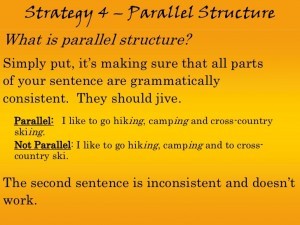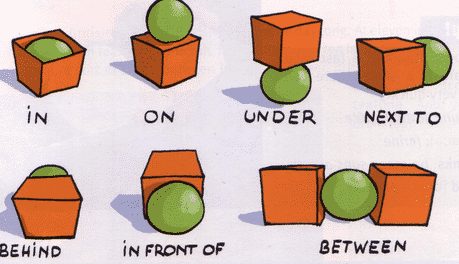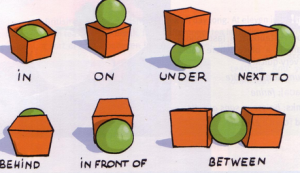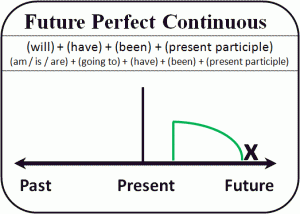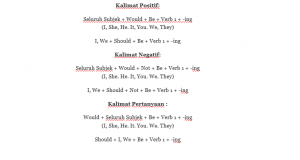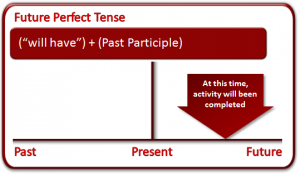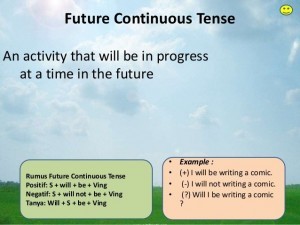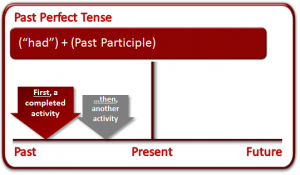Pengertian, Ciri, Pola, Struktur Dan Contoh Kalimat PARALLEL SENTENCE Dalam Bahasa Inggris
Dikutip Dari BUKU : MEGA BANK OF GRAMMAR
THE DEFINITION OF PARALLEL AND ELLIPTICAL SENTENCE
Parallel sentence adalah kalimat yang terdiri dari beberapa komponen yang memiliki pola struktur yang sama.
Contoh Kalimat :
- I spend my holiday by watching movies, playing badminton, and reading novels. (Aku menghabiskan liburanku dengan menonton film, bermain badminton, dan membaca novel)
- My mother’s hobbies are swimming, shopping, and painting. (Hobi ibuku adalah berenang, belanja, dan melukis)
- Andy is diligent, smart, and humble. (Andy itu rajin, pandai, dan rendah hati)
Kalimat Elipsis adalah kalimat yang memiliki struktur sintaksis di mana kalimat tersebut tidak memiliki subjek atau predikat atau tidak memiliki keduanya. Bagian utama dari kalimat elipsis dihilangkan untuk menghindari adanya redundasi (berlebihan).
Contoh:
- I buy a pair of pink shoes. (Aku membeli sepasang sepatu berwarna merah muda)
- She buys a pair of pink shoes. (Dia membeli sepasang sepatu berwarna merah muda)
Gabungan dari dua kalimat di atas adalah :
- I buy a pair of pink shoes and she does too. (Aku membeli sepasang sepatu berwarna pink dan dia juga)
CIRI-CIRI PARALLEL SENTENCE
Terdapat beberapa ciri yang perlu diperhatikan di dalam penulisan parallel sentences, yaitu:
a. Struktur pada parallel sentence harus terbentuk dari unsur-unsur yang memiliki struktur dan fungsi yang sama. Misalnya, ketika kalimat tersebut menggunakan predikat dengan menggunakan pola past tense maka unsur yang lain juga menggunakan past tense. Jika menggunakan pola Gerund, maka yang lain juga mengikutinya.
Contoh:
- Pola kalimat dengan unsur gerund.
My mother’s hobbies are swimming, shopping, and painting. (Hobi ibuku adalah berenang, belanja, dan melukis)
- Pola kalimat dengan menggunakan Adjective.
He is handsome, smart, and humble. (Dia tampan, pandai, dan rendah hati)
- Pola kalimat dengan verba present tense.
Sinta always wakes up early, then sweeps the floor, and goes to school. (Sinta selalu bangun pagi, kemudian menyapu lantai, dan pergi ke sekolah)
- Pola kalimat dengan verba past tense.
Yesterday, I cleaned my backyard, then planted some flowers, and watered them. (Kemarin aku membersihkan halaman belakangku, kemudian menanam beberapa bunga, dan menyiramnya)
- Pola kalimat dengan menggunakan to invinitive.
I have a plan to go to the beaches, to see beautiful sceneries there, and to feel the set breeze.
(Aku berencana untuk pergi ke pantai, melihat pemandangan indah di sana, dan untuk merasakan angit laut yang sepoi-sepoi)
Parallel sentence memiliki pola yang dihubungkan dengan kata penghubung.
- Kata penghubung berupa and, or, as, but. than, serta although.
Contoh:
- This cafe is cozy and romantic. (Cafe ini menyenangkan dan romantis)
- Watching movies is more interesting than listening to the music. (Menonton film lebih menyenangkan dari pada mendengarkan musik)
- Penggunaan more…than, -er…. than… dalam kalimat paralel.
Contoh:
- Playing Badminton is more interesting than playing chess. (Bermain badminton itu lebih menyenangkan daripada bermain catur)
- Rudy is smarter than Rony (Rudy lebih pandai dari Rony)
Contoh: Neither Mr. John nor Mr. Michael attended the committee meeting yesterday. Baik Pak John maupun pak Michael tidak menghadiri rapat komite kemarin.
- Penggunaan not only….but also dalam kalimat paralel.
Contoh: My English teacher is not only smart but also wise. (Guru bahasa Inggrisku tidak hanya pandai tapi juga bijaksana)
Semoga Bermanfaat Para Sahabat SBI 🙂

